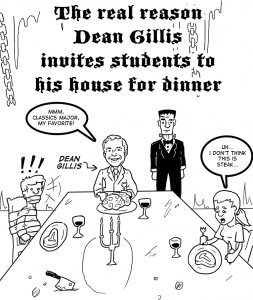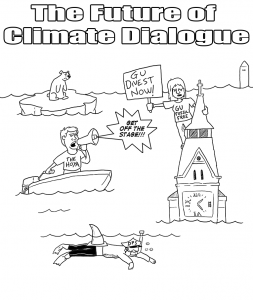Let’s do a quick math problem. According to a 2004 study by the American College Health Association, 14.9 percent of college students have been diagnosed with clinical depression. Of this 14.9 percent, 35.8 percent said they were diagnosed with depression within the last school year, 25.2 percent said they were currently in therapy for depression, and 38 percent said they were currently taking medication for depression. If we do the math, we can estimate that about 373 Georgetown students (out of about 7,000) have been diagnosed with depression in the past year, 263 are in therapy, and 396 are on antidepressants. Some, like me, fit into all three categories.
The repercussions of depression are great for those who deal with it daily. Depression is more than just its physical symptoms.
Antidepressants can dramatically affect your social life at college; anyone who’s been on them knows that it’s not a good idea to drink while taking medication. Some would choose not to drink anyway, but being on medication means that you never get to make that choice.
If you let people know you have depression, it can become all they see about you. People often don’t believe a word you say, even though you’re likely the one who’s most knowledgeable about the issue. For those who were depressed back home, people knew that even when you had a particularly bad day, week, or month, you still weren’t crazy or dumb or illogical. But at college, especially during the first year when no one knows you well, the possibility that you are completely nuts is still on the table.
But if you don’t tell anyone at school about your depression, your actions sometimes become inscrutable. When asked why you aren’t drinking, you’re sometimes forced to make up a lame lie, unless you want to tell your drunk buddy the truth (which you probably don’t). You’re also caught in a bind if you do want to talk about it or need guidance. If you want to gain any insight from the other person, you have to be honest about yourself, which could come with the aforementioned consequences. If you don’t talk to anyone because you don’t want those consequences, you risk watching things get worse.
In the greater diversity of Georgetown, having a mental health issue should not be a big deal. We come from so many backgrounds that your particular differences are just one small speck in the scheme of things, but unfortunately, there are often negative consequences for having mental health issues. Anyone who has made it to Georgetown is intelligent and self-aware, and it’s important to realize that a diagnosis, label, problem, or issue makes up only one small facet of a person. It may also be what makes that person that much more insightful and valuable. As odd as it sounds, depression can actually be quite an enlightening experience, and if you challenge yourself to withhold judgment of yourself and others, you just might realize this.






